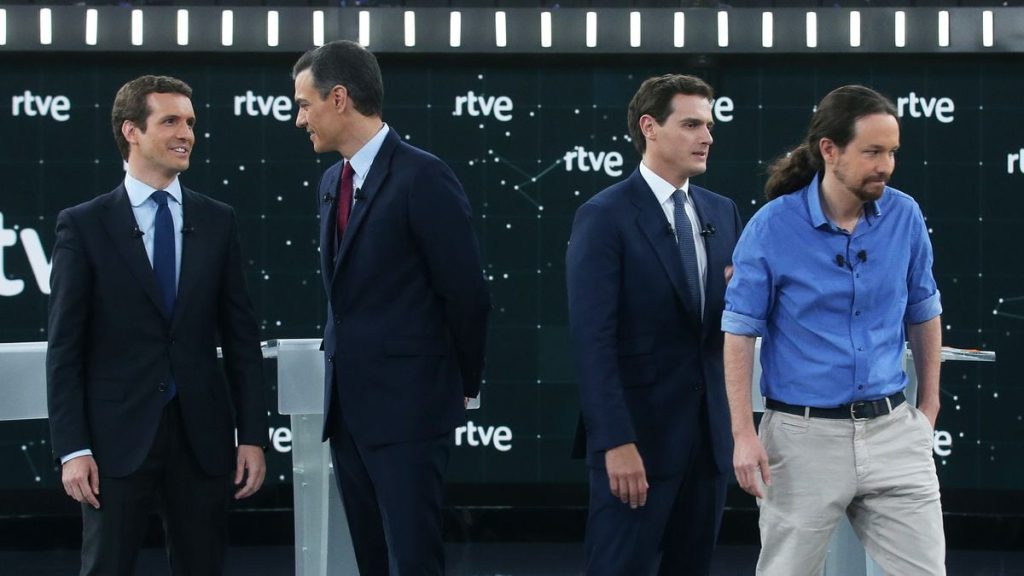Five years ago, four political leaders faced off in a pre-election debate ahead of the general elections on April 28, 2019. Three of them, Pablo Casado, Albert Rivera, and Pablo Iglesias, have changed professions. Only Pedro Sánchez, leader of the PSOE and current President of the Government, remains. The image of that meeting in the TVE studio shows, on its fifth anniversary, the dizzying pace that Spanish politics has acquired, capable of engulfing leaders and parties in less time than a legislative term. It also demonstrates that there are classics of today and of always, acquired vices, irreconcilable positions.
Pedro Sánchez, at the age of 47 on April 22, had been president of the Government for 326 days after winning the motion of censure against Mariano Rajoy in June 2018, prompted by the first major ruling of the Gürtel case. He had beaten Susana Díaz and Patxi López in the PSOE primaries, and a few weeks before the debate, he had published “Manual de resistencia,” the book where he narrates his difficult journey – with internal and external obstacles – to reach La Moncloa. The PSOE faced that first government after the motion with just 85 deputies in Congress, 52 less than the PP. The Popular Party has the same number of seats as then (137), but the Socialists have reduced that gap to 16. The PSOE’s regional power has decreased since then: in April 2019 they had already lost one of their strongholds, Andalusia; they presided over six regional governments and co-governed in three others; now they only preside over the Principality of Asturias, Navarra, and Castilla-La Mancha, and hope to re-edit the two-party coalition with the PNV in Euskadi.
Pablo Casado, the first national leader of the PP elected in primaries, became president of the party just nine months before the debate after his rivals, Soraya Sáenz de Santamaría and María Dolores de Cospedal, cancelled each other out. At 37 years old, in January 2019, he controversially launched his friend Isabel Díaz Ayuso as a candidate for the presidency of the Community of Madrid, ambassador of what he called “the right without complexes.” In his electoral debut, Casado crashed with only 66 deputies. In the repeat elections in November, he gained 22 seats. In February 2022, he was ousted by his party due to an open confrontation with his most personal and risky choice, Ayuso, and internal dissatisfaction with the management of his secretary general, Teodoro García Egea. In April 2022, the Popular Party turned to Alberto Núñez Feijóo. Albert Rivera stepped down just seven months after that debate, when his party went from 57 to 10 deputies after the November repeat elections.
Pablo Iglesias, co-founder of Podemos, became Vice President of the Government nine months after that debate, in January 2020, following the November 2019 repeat elections. A hug with Sánchez sealed the agreement they had been unable to reach since July. Against almost all predictions, the marriage of convenience worked relatively well, but 15 months later, Iglesias left the government to face Ayuso as a candidate for the presidency of the Community of Madrid and pointed to Yolanda Díaz as his successor. The gamble did not pay off: Podemos was the fifth force in the Madrid Assembly, and the disagreements with Díaz began shortly after. In May 2021, Iglesias announced his retirement from politics. The focus on territorial debate, partners, and post-electoral pacts has dominated every election since April 2019, with the parties of the coalition government reproaching the PP for its alliances with Vox and the right-wing criticizing the left for agreements with Catalan separatists and Arnaldo Otegi’s leftist alliance.
Corruption was another key issue in that debate. Sánchez exploited the Gürtel case that propelled him to La Moncloa, reminding Casado of the 12 ministers from the PP being investigated and the nine regional presidents convicted or indicted. Five years later, the PP is pressuring the PSOE with the scandal affecting former advisor Koldo García of ex-Minister José Luis Ábalos, who testified in the Senate investigation committee. The tension has increased and spread to the judicial institutions. The General Council of the Judiciary was already expired in April 2019 and has still not been renewed five years later. Iglesias, who was critical of the judiciary, surprisingly remarked on the need to respect the Spanish justice system during the debate. The political turmoil and shifting alliances have marked Spanish politics in the years following that pivotal debate.















